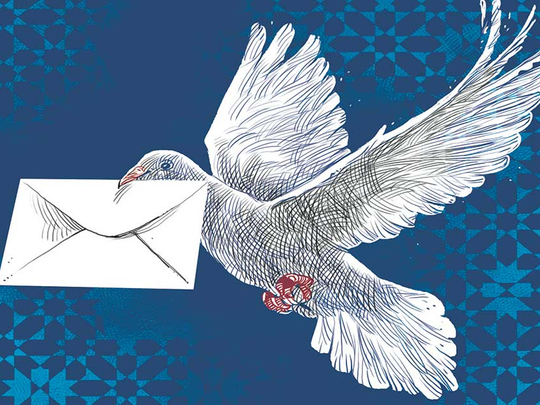
In a dramatic “Open Letter” to Abu Bakar Al Baghdadi, the self-appointed ‘Caliph’ of Daesh (Islamic State of Iraq and the Levant), 126 of the world’s leading Muslim scholars have chastised the wannabe ruler for his un-Islamic behaviour. Regrettably, the September 19, 2014, document received scant media attention, which was not particularly uncommon, given existing prejudices — even if the opportunity to correct misconceptions was once again lost. Still, because our pages and airwaves are filled with frequent accusations that Muslim scholars seldom speak against extremism, one wonders why was this important note — which included a short, single page executive summary that specified where Al Baghdadi erred — ignored by mainstream sources?
Even if the letter leaned on the academic side, as it addressed eschatological [a theological assessment of the ultimate destiny of mankind] concerns, the rejection of the Islamist movement was crystal clear. Among its 24 summary points, the letter forbade selective readings of the Scriptures, qualified who could issue decrees (and how), prohibited the oversimplification of Sharia matters and outlawed the killing of emissaries, ambassadors, diplomats, journalists, aid workers and all innocent individuals caught in ongoing wars. Equally important, it outlawed the facile declaration that non-Muslims could be disposed of at will, because Islam scorned those who wished to harm or mistreat Christians or any “People of the Scripture”.
Much more was prescribed in the communication, including injunctions against torture, the disfiguration of the dead, the attribution of evil acts to God, the destruction of the graves and shrines of Prophets and Companions, as well as armed insurrections. While several observers mentioned that each and every signatory was a Sunni male, the absence of women co-signers or of Shiite scholars was probably intentional, not because the authors wished to exclude women and Shiites, but because including them could have potentially discredited the message they wanted to deliver to hardline Islamists. More important, and since one of its purposes was to reach gullible believers who misinterpreted key sections of Scriptures, the writers wished to deliver a high-impact message.
Interestingly, there is a single page addendum to the letter that refers to the sayings of the Imam Ali Bin Abi Talib, considered by Sunnis as the fourth and final of the rightly guided (Rashidun) caliphs, while Shiites regard him as the first Imam after Prophet Mohammad (PBUH). In this original work, an attempt is made to deconstruct a saying attributed to Nu’aym Ibn Hammad who, in turn, reported what the Caliph Ali apparently said, and that is now being used by Al Baghdadi. The short narrative is masterfully decomposed sentence by sentence in what must be a harsh lesson to any potential follower of Al Baghdadi, which illustrates the theological struggle under way in Muslim societies and that truly deserved particular attention.
Two of the letter’s most important assertions focused on the ban in Islam to “declare a Caliphate without consensus from all Muslims”, and to affirm that “loyalty to one’s nation” was permissible that, in so many words, supported the very idea of the post-Westphalia nation-state system. Of course, while Al Baghdadi rejected the nation-state system, he was chastised for all of his pretences and explicitly told that any act of torture and murder were categorically banned: “You have misinterpreted Islam into a religion of harshness, brutality, torture and murder,” the letter confirmed, which “is a great wrong and an offence to Islam, to Muslims and to the entire world,” it concluded.
Although the signatories hoped that the correspondence would not only be read by Al Baghdadi and his followers, one of its key targets was the pool of potential fighters, particularly from Europe, to appraise the document itself and assess various false arguments used by recruiters. That is why scholars presented their arguments by relying on theological contentions, precisely to refute statements made by Al Baghdadi and his spokesman Abu Mohammad Al Adnani, both of whom felt no compunction to use the Word of God to kill and destroy. The letter concluded with a plea: “Reconsider your actions, desist from them, repent for them, cease harming others and return to the religion of mercy.”
Reuters was one of the few major media sources to take note of the “Open Letter”, even if several websites — Slate, the Daily Beast, and the Huffington Post — provided some attention too. Regrettably, no major western newspapers or television programme deemed the document worthy of consideration and it was unclear whether the letter’s use of classical religious texts prevented most journalists and analysts from devoting the necessary time to absorb its message. For even if the missive was not meant for liberal audiences, it nevertheless confirmed that mainstream Muslim scholars spoke loud and clear against extremists, something that merited courtesy. The letter was unambiguous and without any if and or buts. Stated as clearly as possible, the letter and spirit of the note said it all: Islam opposed violence; there was no such thing as the “Islamic State”; and Al Baghdadi was not a Caliph. Period.
Readers interested in the full letter can access it online at http://www.lettertobaghdadi.com available in Arabic, English, German, Spanish, Bosnian, Hungarian, and Dutch and can peruse the biographies of its signatories. There is even an invitation to endorse the “Open Letter” that is a powerful missive against Al Baghdadi.
Dr Joseph A. Kechichian is the author of the forthcoming Iffat Al Thunayan: An Arabian Queen, London: Sussex Academic Press, 2015.










